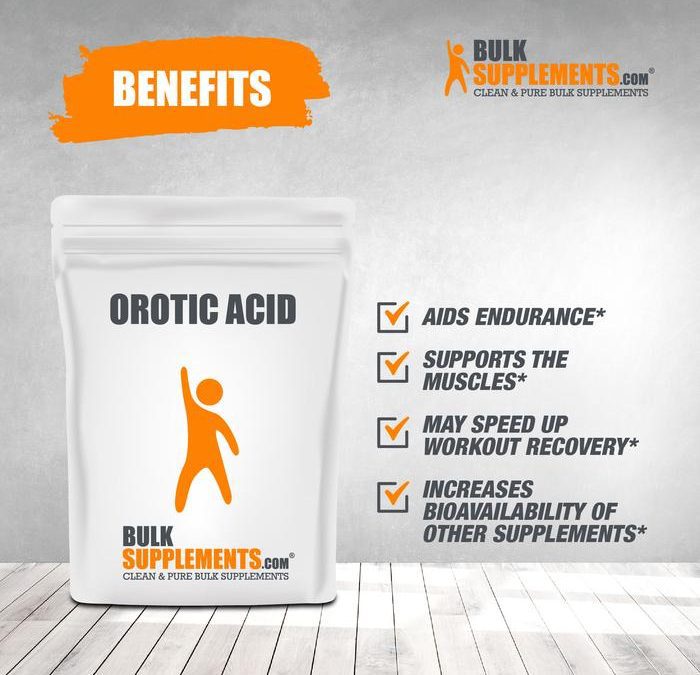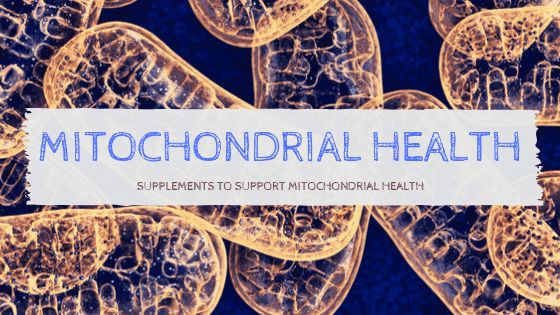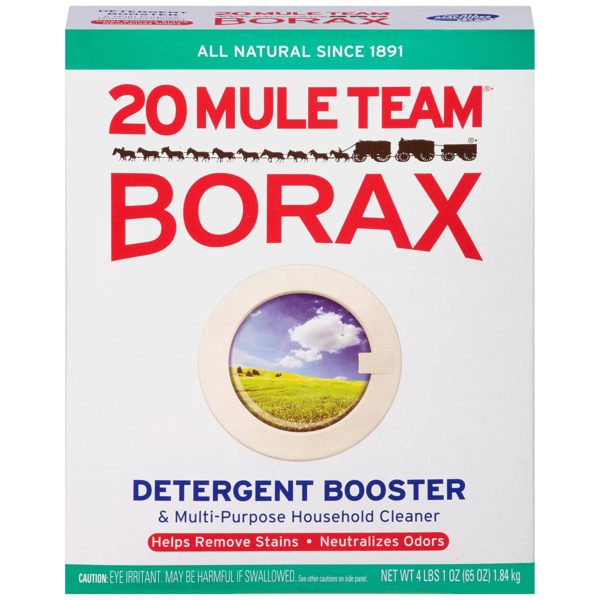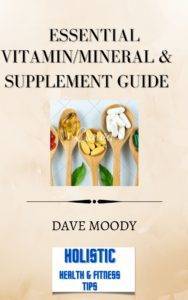Overview
Is it possible that a substance known for over 100 years can do so much with so little fanfare? Orotic acid is a compound that has been associated with the vitamin B complex historically and also one of five compounds in riboflavin. Orotic acid was first discovered by the German chemist, Georg F. Stobbe in 1869. Stobbe isolated Orotic acid from rice water which is where it gets its name.
Orotic acid is found in seafood, apples, raspberries and root vegetables. Orotic acid is derived from the decay of ribonucleotides in the body and is also essential for cellular metabolism.
Orotic acid is a molecule that can be found throughout nature. It was considered part of the vitamin B complex though it is no longer classified as such. It is found in humans, animals, plants, soil, water, and other natural sources such as mushrooms and root vegetables in small quantities.
Orotic Acid Background
Orotic acid is a non-protein amino acid sometimes referred to as a vitamin. Orotic acid is synthesized from pyrimidines in the liver and is one of the most powerful natural energy molecules in the human body. When Orotic acid is ingested, it can provide many direct and indirect medicinal and health benefits for the individual. Some of these benefits are increased athletic performance, an increased ability to produce ATP, and even a molecule for anti-aging.
Orotic acid is mostly produced by the liver and kidneys although as mentioned, it can also be obtained through various foods in small quantities. Orotic acid converts to beta-alanine, which is the precursor of anserine and carnosine. These are powerful “proton buffering agents” which delay fatigue and help boost endurance. This conversion is made possible by a two-step process: #1 – Orotic acid is converted to 2,4-dihydroxybenzoic acid via the enzyme Beta-OAT; #2 – This intermediate compound is then converted to beta-alanine.
Orotate (orotic acid): An essential and versatile molecule
ABSTRACT Orotate (OA) is well-known as a precursor in biosynthesis of pyrimidines; in mammals it is released from the mitochondrial dihydroorotate dehydrogenase (DHODH) for conversion to UMP by the cytoplasmic UMP synthase enzyme. OA is also a normal part of the diet, being found in milk and dairy products, and it is converted to uridine for use in the pyrimidine salvage pathway predominantly in liver, kidney and erythrocytes.
Early research into nutrition identified orotate as “vitamin B13,” and its use as a complex with organic cations or metal ions was promulgated in body-building, and in assisting therapies of metabolic syndromes. It has recently been established that the amelioration of gout by dairy products arises from the competition of orotate and urate at the hURAT1 transporter.
The orotic aciduria that arises in children with defective UMP synthase can be rescued by oral uridine therapy, since UMP is the end-product and also a feedback inhibitor of the de novo pathway. In contrast, Miller (dysmorphology) syndrome is connected with defects in DHODH, and hence in the supply of OA, and cannot be helped by uridine. Other models of dysmorphisms are connected with enzymes early in the pyrimidine de novo pathway. We conclude that the OA molecule is itself required for the regulation of genes that are important in the development of cells, tissues and organisms
@article{Loffler2016OrotateA, title={Orotate (orotic acid): An essential and versatile molecule}, author={Monika Löffler and Elizabeth A. Carrey and Elke Zameitat}, journal={Nucleosides, Nucleotides and Nucleic Acids}, year={2016}, volume={35}, pages={566 – 577} }
That’s a powerful paper on orotic acid that essentially says it’s Essential! Who knew? Why does it fly under the radar? Look no further than big pharma who has demonized this molecule just like vitamin D, iodine, etc. etc. Same game plan that leaks out an undocumented story reporting it’s dangerous and could possibly create tumors!
Youthful Skin
Skin is the largest organ of our body, so it makes sense that maintaining its health is important. Studies show that orotic acid can help to maintain healthy skin by acting as an antioxidant and providing protection against UV damage, among other benefits.
A healthy and glowing complexion is a sign of youth and beauty. One way to promote healthy and radiant skin is to consume foods that contain Orotic acid. In fact, Orotic acid is often an ingredient in cosmetic products designed to help foster skin health.
Regenerates and Supercharges Metabolic Functions
The excretory system is a series of organs and glands that work together to help rid the body of wastes such as carbon dioxide, urea, and ammonia. The kidneys play a big role in this process by helping to regulate blood volume and pressure. The liver produces bile acids that help break down fats and convert cholesterol into bile salts.
hese products are then expelled through the intestines and later eliminated from the body during bowel movements or urination. Orotic acid helps in the regeneration of liver cells and in the development of bilirubin, a compound that helps prevent fatty liver due to its hepatoprotective properties.
Central Nervous System
Orotic acid is important to the central nervous system as it can help prevent and fight multiple sclerosis which interferes with the flow of information in the brain. The heart requires high amounts of ATP, which can also be assisted by orotic acid. Mitochondria in the heart send out reactive oxygen species and these particles increase in intensity when ATP levels are low.
Orotic acid helps with the production of ATP in the mitochondria and has been found to lower reactive oxygen species at low dose rates.
Boosts Vitamin B12 and Iron Absorption
Orotic Acid for Vitamin B12 or Cobalamin and Iron Deficiency
This deficiency is known as anemia, which occurs from a lack of vitamin B12 or malabsorption that interferes with the production of red blood cells in the body.
The absorption of vitamin B12 in the human digestive tract is dependent on the presence of intrinsic factor, which is made by the stomach. Those who suffer from pernicious anemia, gastrectomy, or other reasons for malabsorption may not be able to absorb vitamin B12 from their diets. In those cases, a doctor may recommend an injection of orotic acid-a readily available form of vitamin B12-in order to make up for the deficiency!
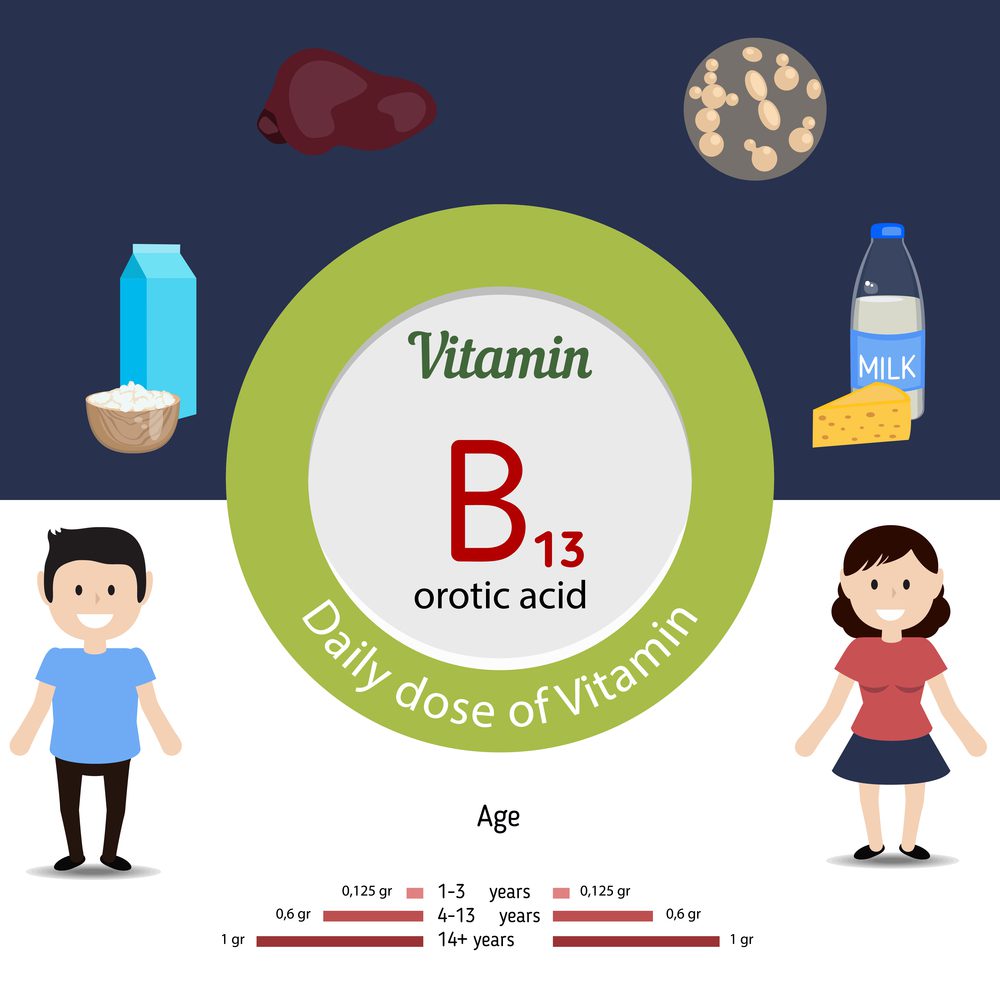
Beneficial to Longevity
Vitamin B12 deficiency is an issue that affects many people. A lack of this vitamin can cause jaundice, anemia, and neurological damage. There are two main reasons for vitamin B12 deficiency, pernicious anemia and low levels of intrinsic factor in the stomach. Orotic acid acts as an extension of vitamin B12 and is used to treat both pernicious anemia and boost intrinsic factor.
There is new research that offers exciting results from Orotic acid. This natural vitamin like molecule boosts energy by helping to convert nutrients into fuel! This action already occurs naturally you say but for millions, nutrient absorption is incomplete at best and gets worse with age. The International Journal of Sport Nutrition and Exercise Metabolism has shown that Orotic acid reduces exhaustion and fatigue for individuals who take part in vigorous activities like weightlifting, bodybuilding and even caloric restriction!
One of the earliest researchers of Orotic acid was Japanese scientist Yoshio Oda who discovered the effects of Orotic acid on the metabolism of glucose through his research on rats. He found that Orotic acid can be used as a treatment for diabetes type II which relies on insulin to control blood sugar levels in the body.
Can Reverse Anemia
Orotic acid stimulates the production of red blood cells and helps those who suffer from anemia. Orotic Acid is a naturally occurring molecule found in small amounts in the human body. It is safe for ingestion and the recommended dietary allowance of Orotic Acid powder ranges from 500 to 1000 mg per day. The molecular weight of orotic acid is 266.349 g/mol. The pKa (pH) is 3. This is an acidic ph for sure and why it aids intrinsic factor and absorption of nutrients.
The stomach ph is around 2 to 3 so orotic acid is at a beneficial number for gut health but may cause upset in those with poor gut ph that is too alkaline. It should be consumed in a small trial amount and built up with time. A person with good gut ph will not have a negative reaction however a person that uses antacids regularly and has a higher ph will likely have a negative response until the gut ph adapts.
Orotic acid is a naturally occurring essential nutrient found in a wide variety of foods, mainly root vegetables and some dairy. It plays a significant role in the synthesis of human DNA and RNA. Studies have shown that Orotic acid can play a role in controlling diabetes. Some studies suggest that Orotic acid supplementation could be as important as insulin for some diabetics.
Boosts Muscle Recovery
Orotic acid also helps in muscle recovery and is said to be safe, natural, and non-addictive. A main function of Orotic acid is to provide energy through metabolism while other functions include protection against oxidative stress that can cause cancer, heart disease, diabetes, arthritis and many other diseases.
Studies have shown that Orotic acid is essential for the synthesis of creatine phosphate in muscle cells which increase muscle endurance. This compound has been shown to be beneficial by decreasing the accumulation of lactic acid in muscles without affecting the production of energy or reducing muscular contraction time. The most studied and recommended creatine is creatine monohydrate however recent evidence indicates with the addition of Orotic acid, the benefits greatly increase when coupled with monohydrate!
Where to Get Orotic Acid:
Orotic acid is important for cells to function properly in both the body and the brain. Low levels of Orotic acid may lead to exhaustion, poor exercise performance, poor memory, and even depression.
Benefits of Orotic Acid and Caveats
Orotic acid is beneficial for:
- cardiovascular
- nervous
- excretory
- immune
- muscular systems.
- Orotic acid can address vitamin B12 or cobalamin deficiency and anemia.
- Orotic acid is good for the skin.
Rare Caveat: Hereditary Orotic Aciduria Goes by the Following Terms:
- hereditary orotic aciduria
- orotic aciduria type 1
- OA type 1
- orotidylic pyrophosphorylase and orotidlyic decarboxylase deficiency
- UMPS deficiency
- uridine monophosphate synthase deficiency
Unfounded Concern?
Hereditary orotic aciduria is an extremely rare genetic disorder. When untreated, affected infants can develop a blood (hematologic) disorder called megaloblastic anemia as well as failure to thrive, susceptibility to infection, and orotic acid crystals in the urine (crystalluria) resulting from excretion of orotic acid in the urine. Impaired neurological development has been observed, but invariably, especially since a treatment has become available.
Because so few individuals have been identified with this disorder, much about hereditary orotic aciduria is not fully understood. The disorder is caused by variations in the UMPS gene. In 2015, the U.S. Food and Drug Administration (FDA) approved a treatment called uridine triacetate (Xuriden) for this disorder.
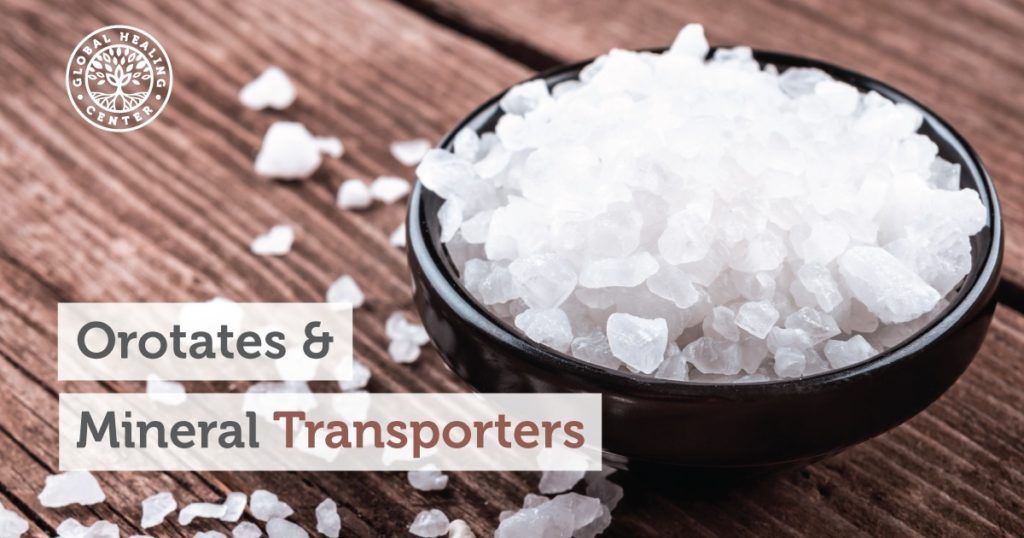
Orotates as Mineral Transporters
What Are Orotates?
Orotates are the mineral salts of Orotic acid. Orotates are part of a system of electrolyte carriers that distribute minerals throughout the body. [1] Some orotate molecules can pass through cell membranes without breaking apart, allowing them to be absorbed very efficiently. [2] Because they’re absorbed so well, they make a fantastic delivery system for minerals. In other words, these orotates when coupled to some of the minerals featured below, supercharge their absorption. Using Orotic acid by itself has benefits mentioned throughout this article and can be combined with other molecules and supplements like the example of creatine to boost absorption.
Magnesium Orotate
Of all the minerals, magnesium is one of the most important. It’s helpful for migraines, the upper respiratory system, blood vessel elasticity, and cardiovascular health. [3] Combining magnesium with orotates enhances mineral transport and is superior to other magnesium supplements. [4] [5] [6] [7]
Potassium Orotate
Potassium deficiency is often a secondary consequence of magnesium deficiency. [8] Another cause is the use of potassium-wasting diuretics to control high blood pressure. [9] Potassium orotate supports cardiovascular health when combined with magnesium orotate. Potassium orotate supports wound healing and can speed up recovery following surgery. [10] [11] Potassium orotate also helps the body absorb vitamin C. [12] Animal studies suggest regular potassium orotate supplementation has a positive effect on mental well-being. [13]
Lithium Orotate
Lithium carbonate, the treatment for manic-depressive disorders, is structurally different from lithium orotate. Lithium orotate offers neuroprotective effects, immune system support, and positive effects on liver, cardiovascular, thyroid, and immune function. Lithium carbonate is prescription only and requires nearly 100 times the dose for therapeutic effect compared to lithium orotate!
If you suffer from an autoimmune disease such as rheumatoid arthritis or lupus, you should speak with your healthcare professional before taking lithium supplements. While lithium is a natural element, it has been known to cause reactions in some people. [14]
Zinc Orotate
Zinc is necessary for bone health and is vital for the immune system. [15] [16] Zinc deficiency causes atrophy of the thymus, reduction in white blood cells, and susceptibility to infection. [17] [18] Males who are zinc deficient can experience hypogonadism and low testosterone levels. [19] Zinc is also important for growth hormone activity. [20] One of the major, nutritional benefits of zinc is its antioxidant activity. [21] [22] [23]
Calcium Orotate
Calcium supplements get credit for supporting skeletal health. Among them, calcium orotate is the most effective. Small servings of calcium orotate can be effective for promoting skin health and supporting normal blood pressure. If you’re looking for a calcium orotate supplement, IntraCal™ contains both calcium and magnesium orotate. Without magnesium, calcium can cause nerves to be over-activated, over-contracted, and tense.
Orotic Acid Reference Resources
- Nieper HA. Recalcification of bone metastases by calcium diorotate. Agressologie. 1970;11(6):495-502. Available as article #CA21 from the A. Keith Brewer International Science Library at (608) 647-6513 or on the Web.
- Nieper HA. The clinical applications of lithium orotate. A two years study. Agressologie. 1973;14(6):407-11. Available as article #CM12 from the A. Keith Brewer International Science Library at (608) 647-6513 or on the Web.
- Swain R, Kaplan-Machlis B. Magnesium for the next millennium. South Med J. 1999;92(11):1040-7.
- Rosenfeldt FL. Metabolic supplementation with orotic acid and magnesium orotate. Cardiovasc Drugs Ther. 1998;12(Suppl 2):147-52.
- Villanyi P, Votin J, Rahlfs V. Arteriosclerosis, myocardial infarct and blood lipids, their therapeutic modification by magnesium orotate [in German]. Wien Med Wochenschr. 1970;120(5):76-83.
- Jellinek H, Takacs E. Morphological aspects of the effects of orotic acid and magnesium orotate on hypercholesterolaemia in rabbits. Arzneimittelforschung. 1995;45(8):836-42.
- Nieper HA. Capillarographic criteria on the effect of magnesium orotate, EPL substances and clofibrate on the elasticity of blood vessels. Agressologie. 1974;15(1):73-7. Available as article #CM19 from the A. Keith Brewer International Science Library at (608) 647-6513 or on the Web.
- Altura BM, Altura BT. Interactions of Mg and K on blood vessels-aspects in view of hypertension. Review of present status and new findings. Magnesium. 1984;3(4-6):175-94.
- Franse LV, Pahor M, Di Bari M, Somes GW, Cushman WC, Applegate WB. Hypokalemia associated with diuretic use and cardiovascular events in the Systolic Hypertension in the Elderly Program. Hypertension. 2000;35(5):1025-30.
- Kolokol’chikova EG, Pal’tsyn AA. Electron-radioautographic study of the effect of potassium orotate on RNA and protein synthesis in fibroblasts during experimental wound healing [in Russian]. Biull Eksp Biol Med. 1983;96(8):115-8.
- Bilich GL, Nazarova LV, Sungurova EV. The enzymatic status of circulating lymphocytes as an index of the regenerative process in the lungs under stimulation with pyrimidine and purine derivatives. A clinical experimental study. Haematologia (Budap). 1982;15(1):71-81.
- Kuzdenbaeva RS, Kurakina VE, Iztleuov MK. Effect of anabolic substances on the state of the individual components of the glutathione-ascorbic acid system. Farmakol Toksikol. 1980;43(5):607-9.
- Karkishchenko NN, Khaitin MI. Comparative study of the indices of the antidepressive activity of potassium orotate and piracetam [in Russian]. Farmakol Toksikol. 1985;48(2):32-5.
- Lieb J. Lithium and immune function. Med Hypotheses. 1987;23(1):73-93.
- Atik OS. Zinc and senile osteoporosis. J Am Geriatr Soc. 1983;31(12):790-1.
- Igarashi A, Yamaguchi M. Increase in bone protein components with healing rat fractures: enhancement by zinc treatment. Int J Mol Med. 1999;4(6):615-20.
- Mocchegiani E, Giacconi R, Muzzioli M, Cipriano C. Zinc, infections and immunosenescence. Mech Ageing Dev. 2000;121(1-3):21-35.
- Fraker PJ, Jardieu P, Cook J. Zinc deficiency and immune function. Arch Dermatol. 1987;123(12):1699-701.
- Prasad AS, Mantzoros CS, Beck FW, Hess JW, Brewer GJ. Zinc status and serum testosterone levels of healthy adults. Nutrition. 1996;12(5):344-8.
- Kurtogu S, Patiroglu TE, Karakas SE. Effect of growth hormone on epiphyseal growth plates in zinc deficiency. Tokai J Exp Clin Med. 1987;12(5-6):325-9.
- Powell SR. The antioxidant properties of zinc. J Nutr. 2000;130(5S Suppl):1447S-54S.
- DiSilvestro RA. Zinc in relation to diabetes and oxidative disease. J Nutr. 2000;130(5S Suppl):1509S-11S.
- Floersheim GL. Synergism of organic zinc salts and sulfhydryl compounds (thiols) in the protection of mice against acute ethanol toxicity, and protective effects of various metal salts. Agents Actions. 1987;21(1-2):217-22.

